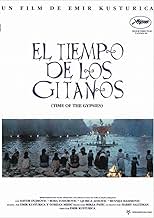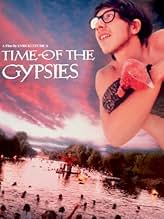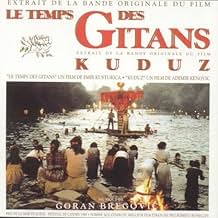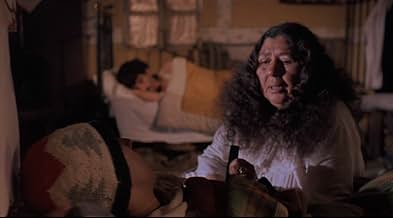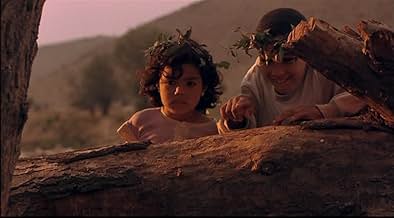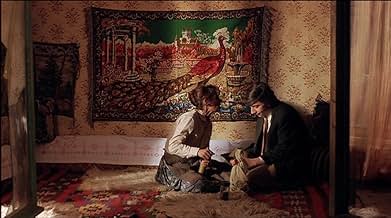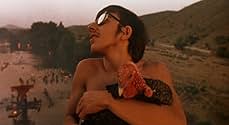CALIFICACIÓN DE IMDb
8.1/10
34 k
TU CALIFICACIÓN
En esta brillante historia que se desarrolla en Sarajevo y en Italia, Perhan, un encantador joven rumano (de etnia gitana) con poderes telequinéticos, se deja seducir por el mundo del dinero... Leer todoEn esta brillante historia que se desarrolla en Sarajevo y en Italia, Perhan, un encantador joven rumano (de etnia gitana) con poderes telequinéticos, se deja seducir por el mundo del dinero rápido que amenaza con destruirlo a él y a las personas que ama.En esta brillante historia que se desarrolla en Sarajevo y en Italia, Perhan, un encantador joven rumano (de etnia gitana) con poderes telequinéticos, se deja seducir por el mundo del dinero rápido que amenaza con destruirlo a él y a las personas que ama.
- Dirección
- Guionistas
- Elenco
- Premios
- 3 premios ganados y 5 nominaciones en total
- Dirección
- Guionistas
- Todo el elenco y el equipo
- Producción, taquilla y más en IMDbPro
Opiniones destacadas
Dom za vesanje is not a movie that an average viewer can comprehend thoroughly, but this doesn't change the fact that it's a masterpiece. Emir Kusturica's storytelling requires some talent, intelligence, and flawless attention to follow and understand correctly, nonetheless it's absolutely unique and fantastic. I would never ever have thought I'd enjoy seeing the world through Yugoslavian gypsies' eyes, but it turned out to be possible so long as it's Kusturica who opens the window. Goran Bregovic's adorable tunes suit the movie perfectly fine too. This movie was one of those that strengthened my opinion which states European movies are a billion times better than American movies. Thanks to Kusturica and Bregovic for producing such a beauty. A perfect 10 for the cast as well.
A civilization is a tree whose branches expand to the world while deeply rooted in the motherland, the one place where we cease to be a stranger. But there are eternal strangers who never belong to the place they live in, we call them Nomads, Romani or Gypsies. They have a culture, a language, a music (and how!) and while there might not be a place, there will always be a "Time of the Gypsies".
On Youtube, an Internet user said about that scene where a devastated Perhan drowns his sorrow in booze and music: "I don't understand what he's singing but it's like I understand everything." That's exactly how emotionally affecting Emir Kusturica's movies are and his 1988 masterpiece that won the Cannes Prize for Best Directing is no exception. Kusturica's movies are culturally specific but universally cathartic. Universal to a certain extent... even if it's set somewhere in Yugoslavia, this is a film about the gypsies, perhaps the most misunderstood if not disdained people on Earth, connected to many infamous caricatures from stealing chicken to prostitution.
And it says a lot when the main character is the fruit of the passion between a Slovenian soldier and a gypsy mother who died after giving birth to his sister a few years later. Perhan, to name him... and to call a spade a spade, is a bastard, but Kusturica almost gives this word a touch of nobility, as if it captured the existential status of gypsies, they have traditions and pride but they don't know where they're from, they belong to the present, and their greatest tragedy is to keep on longing for a past so unknown and so far it is deemed to carry a shadow of mystery. Perhan is mysterious in his own way, a young and nerdy insecure boy with a talent for accordion, a turkey for a companion and a telekinetic power.
He was raised by his grandmother, the kind of stereotypical gypsy woman whom you'd give her palm and trust whatever she says about your future but there's nothing cliché about her, she's perhaps one of the most loving and endearing mother figures from any movie, she drinks, she smokes, forgives her depraved son and love her grandchildren. Ljubica Adzovic gives the kind of performances that always gets Oscar nods, it's a disgrace that she didn't win anything at Cannes, or maybe she's just too authentic for that. Still, she's as pivotal to the film as she is in Perhan's life. Perhan who falls in love with Azra but can't marry her because her mother wouldn't give her daughter's hand to a bastard. This prompts Perhan to become someone and he promises the mother that she'll soon kiss his feet.
Circumstances help him when the grandmother cures the son of a rich man named Ahmed (Bora Todorovic, the band leader in "Underground"). Ahmed promises to take Perhan under his protections and takes his sister to a hospital in Slovenia, so she can be cured from a severe leg condition. But the film isn't much about that story than it is about the young boy who encapsulates the exhilaration and tragedy of being a gypsy. As a bastard, he's twice an outcast and ostracized in his own community, forcing him to resort to crime in order to win quick cash and become respected. And with his glasses and nerdy smile, Dujmovic bears a striking resemblance with Dustin Hoffman in "Papillon" or "Straw Dogs" while as the film progresses, his hair grow and he looks more like Hoffman or a Pacino in their prime, with that intensity in the eyes and that oddly charismatic vulnerability.
The actor committed suicide in 1999, was it drugs? The Yugoslavian tragedy? Or some secret demons he took to the grave? Whatever it was, I suspect he carried that early enough so it could translate into this performance, one of the greatest performances from a relatively unknown actor, and perhaps the most intense performance in any Kusturica film. Dujmovic is the first reason to enjoy the film or perhaps the second after the music, I saw this film 25 years ago, and I remember I was mesmerized by the themes from Goran Bergovic. I never forgot the scene where they were all floating in the river, following some ancestral ritual and the one where Perhan got drunk after realizing he would also have a bastard as a son. These two emotional peaks illustrate gypsies' predestination for parties because there's so much melancholy and sadness one would rather try to forget them.
And yet the film doesn't sugarcoat the other aspects such as prostitution or human traffic, it exposes them with some sort of cynicism on the surface but in reality a way to show that once you don't have rules, you do with what you have at hands and you're the one to set your own limitations or code of honor. The film doesn't show gypsies enjoying begging or stealing or selling children, but it finds a way to show that pride is a variable parameter, a bit like in "The Godfather" when you disdain Mafia but you understand why it exists. And for a culture torn between the European accordion and Oriental tunes waltz (I come from North Africa, I can tell you their dances isn't different from ours), nothing surprises me anymore.
That's who the Gypsies are, people at the crossroads of the Western and Oriental world, a marriage never bound to happen but worthy of a celebration, the film opens and ends with Kusturica's iconic leitmotif of a wedding leading to a tragedy, and yet a rebirth, a symbol reprised in his "Underground". Kusturica has a unique talent to immerse you into the depths of a civilization, as if we were the objects Perhan could move with his simple wizardry, this might be an allegory of Kusturica power. It's all about moving us and making us move at the beat of a trumpet ... or fly like his smiling brides.
On Youtube, an Internet user said about that scene where a devastated Perhan drowns his sorrow in booze and music: "I don't understand what he's singing but it's like I understand everything." That's exactly how emotionally affecting Emir Kusturica's movies are and his 1988 masterpiece that won the Cannes Prize for Best Directing is no exception. Kusturica's movies are culturally specific but universally cathartic. Universal to a certain extent... even if it's set somewhere in Yugoslavia, this is a film about the gypsies, perhaps the most misunderstood if not disdained people on Earth, connected to many infamous caricatures from stealing chicken to prostitution.
And it says a lot when the main character is the fruit of the passion between a Slovenian soldier and a gypsy mother who died after giving birth to his sister a few years later. Perhan, to name him... and to call a spade a spade, is a bastard, but Kusturica almost gives this word a touch of nobility, as if it captured the existential status of gypsies, they have traditions and pride but they don't know where they're from, they belong to the present, and their greatest tragedy is to keep on longing for a past so unknown and so far it is deemed to carry a shadow of mystery. Perhan is mysterious in his own way, a young and nerdy insecure boy with a talent for accordion, a turkey for a companion and a telekinetic power.
He was raised by his grandmother, the kind of stereotypical gypsy woman whom you'd give her palm and trust whatever she says about your future but there's nothing cliché about her, she's perhaps one of the most loving and endearing mother figures from any movie, she drinks, she smokes, forgives her depraved son and love her grandchildren. Ljubica Adzovic gives the kind of performances that always gets Oscar nods, it's a disgrace that she didn't win anything at Cannes, or maybe she's just too authentic for that. Still, she's as pivotal to the film as she is in Perhan's life. Perhan who falls in love with Azra but can't marry her because her mother wouldn't give her daughter's hand to a bastard. This prompts Perhan to become someone and he promises the mother that she'll soon kiss his feet.
Circumstances help him when the grandmother cures the son of a rich man named Ahmed (Bora Todorovic, the band leader in "Underground"). Ahmed promises to take Perhan under his protections and takes his sister to a hospital in Slovenia, so she can be cured from a severe leg condition. But the film isn't much about that story than it is about the young boy who encapsulates the exhilaration and tragedy of being a gypsy. As a bastard, he's twice an outcast and ostracized in his own community, forcing him to resort to crime in order to win quick cash and become respected. And with his glasses and nerdy smile, Dujmovic bears a striking resemblance with Dustin Hoffman in "Papillon" or "Straw Dogs" while as the film progresses, his hair grow and he looks more like Hoffman or a Pacino in their prime, with that intensity in the eyes and that oddly charismatic vulnerability.
The actor committed suicide in 1999, was it drugs? The Yugoslavian tragedy? Or some secret demons he took to the grave? Whatever it was, I suspect he carried that early enough so it could translate into this performance, one of the greatest performances from a relatively unknown actor, and perhaps the most intense performance in any Kusturica film. Dujmovic is the first reason to enjoy the film or perhaps the second after the music, I saw this film 25 years ago, and I remember I was mesmerized by the themes from Goran Bergovic. I never forgot the scene where they were all floating in the river, following some ancestral ritual and the one where Perhan got drunk after realizing he would also have a bastard as a son. These two emotional peaks illustrate gypsies' predestination for parties because there's so much melancholy and sadness one would rather try to forget them.
And yet the film doesn't sugarcoat the other aspects such as prostitution or human traffic, it exposes them with some sort of cynicism on the surface but in reality a way to show that once you don't have rules, you do with what you have at hands and you're the one to set your own limitations or code of honor. The film doesn't show gypsies enjoying begging or stealing or selling children, but it finds a way to show that pride is a variable parameter, a bit like in "The Godfather" when you disdain Mafia but you understand why it exists. And for a culture torn between the European accordion and Oriental tunes waltz (I come from North Africa, I can tell you their dances isn't different from ours), nothing surprises me anymore.
That's who the Gypsies are, people at the crossroads of the Western and Oriental world, a marriage never bound to happen but worthy of a celebration, the film opens and ends with Kusturica's iconic leitmotif of a wedding leading to a tragedy, and yet a rebirth, a symbol reprised in his "Underground". Kusturica has a unique talent to immerse you into the depths of a civilization, as if we were the objects Perhan could move with his simple wizardry, this might be an allegory of Kusturica power. It's all about moving us and making us move at the beat of a trumpet ... or fly like his smiling brides.
This is the kind of movie I cannot forget. Well, to be honest, the reason why I watched it was to see my girlfriend, who suggested to watch it at her's. I wasn't really impressed by the movie and I thought it'd be another of those I'd forget about. And I wouldn't comment on it if there wouldn't be something special to it. I just keep thinking about it again and again, and I get the feeling it wasn't so boring as I thought. That's exactly what I find interesting. There are movies which you think are bad, and forget about them. There are movies where you see they are great and you never forget them. And there are movies which you think they haven't impressed you at all, but after some time you still think about them and you keep remembering them whether you like it or not. And eventually you find that they were quite good just the way they was. And so is this movie. What it wants to tell you is not the story it tells - a story which you may find uninteresting, longish, alien, of no matter to you. This film wants to give you an impression of the Gypsy way of life. And after seeing it and thinking about it, you feel like understanding the Gypsies somewhat more.
When I see a Kusturica film, I see the magic of Fellini but with a sinister edge. His characters may be crude and immorally incorrect, but interesting enough as an observation piece that represents the madness of life. All this done through an epic journey taken by the young and shy Perhan, who discovers the crudeness of live that alters his whole believes and existence. The film plays like an opera, but without the soap, making it another Kusturica masterpiece that mixes the real with the bizarre.
'Time of the Gypsies' is a big, full movie.
It is full in the way a magic realism novel is full, with its intergenerational cast of characters; its vivid sense of place, the weather and community life, where private is always public, where joy and tragedy are inextricable; where magic, dream and delusion are indistinguishable.
It is full in the Fellini sense, with its grand, often hallucinatory, set pieces; its profusion of grotesques; its bursting compression of many plots; its general noisiness.
It is one film containing many simultaneous films (a gangster film; a surreal road movie; a romantic comedy; a rites-of-passage; a Christian allegory).
It somehow feels a little thin, like a tapestry of chunks from a massive novel. It is certainly a prime example of retrospective dating - at the time it seemed a masterpiece; over a decade on, it's pastiche Kusturica.
It is full in the way a magic realism novel is full, with its intergenerational cast of characters; its vivid sense of place, the weather and community life, where private is always public, where joy and tragedy are inextricable; where magic, dream and delusion are indistinguishable.
It is full in the Fellini sense, with its grand, often hallucinatory, set pieces; its profusion of grotesques; its bursting compression of many plots; its general noisiness.
It is one film containing many simultaneous films (a gangster film; a surreal road movie; a romantic comedy; a rites-of-passage; a Christian allegory).
It somehow feels a little thin, like a tapestry of chunks from a massive novel. It is certainly a prime example of retrospective dating - at the time it seemed a masterpiece; over a decade on, it's pastiche Kusturica.
¿Sabías que…?
- TriviaThe first feature to be filmed with its entire dialogue in the Gypsy language, Romany.
- ConexionesFeatured in Horrible Reviews: Best Movies I've Seen In 2021 (2022)
Selecciones populares
Inicia sesión para calificar y agrega a la lista de videos para obtener recomendaciones personalizadas
- How long is Time of the Gypsies?Con tecnología de Alexa
Detalles
- Fecha de lanzamiento
- Países de origen
- Idiomas
- También se conoce como
- Time of the Gypsies
- Locaciones de filmación
- Sutka, North Macedonia(most of the film)
- Productoras
- Ver más créditos de la compañía en IMDbPro
Taquilla
- Total en EE. UU. y Canadá
- USD 280,015
- Tiempo de ejecución2 horas 22 minutos
- Color
- Relación de aspecto
- 1.85 : 1
Contribuir a esta página
Sugiere una edición o agrega el contenido que falta

Principales brechas de datos
By what name was Tiempo de gitanos (1988) officially released in India in English?
Responda


